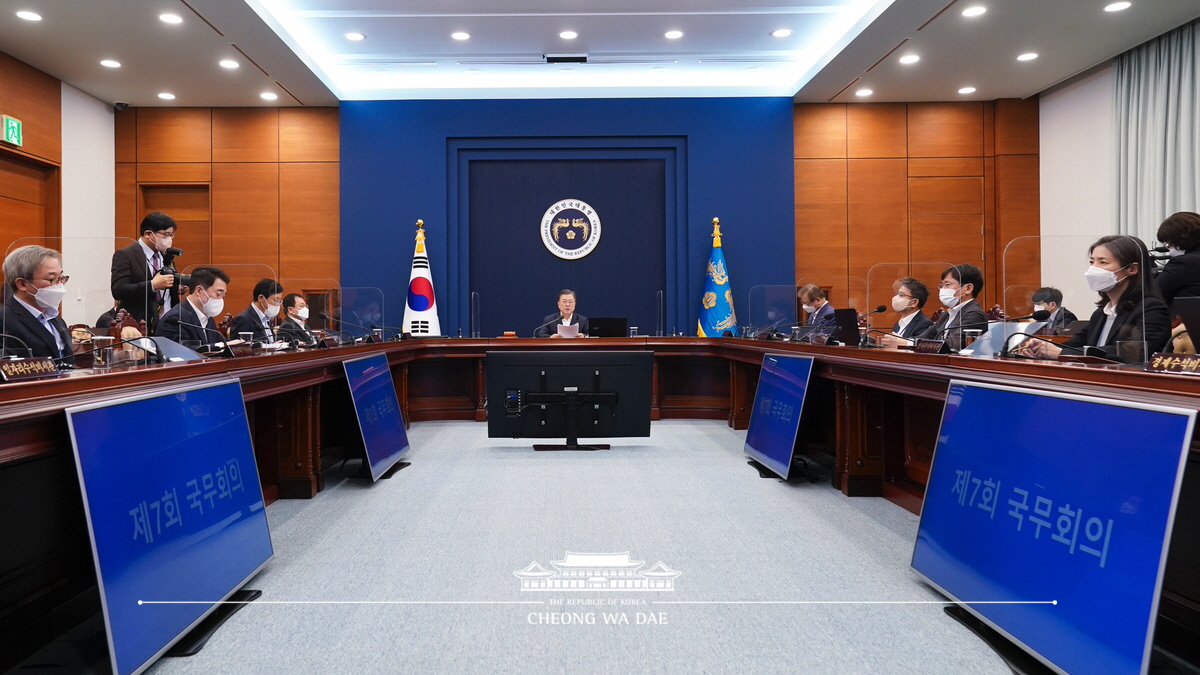이 웹사이트는 제19대 대통령 임기 종료에 따라 대통령기록관이 「대통령기록물 관리에 관한 법률」에 의해 이관받아 서비스하는 대통령기록물입니다. 자료의 열람만 가능하며 수정 · 추가 · 삭제는 불가능합니다.
다만, 「개인정보보호법」에 의하여 개인의 정보를 보호받기 원하시는 분은 관련 내용(요청자, 요청내용, 연락처, 글위치)을 대통령 웹기록물 담당자(044-211-2253)에게 요청해 주시면 신속히 검토하여 조치해 드리겠습니다. 감사합니다.
SPEECHES & REMARKS
BRIEFINGS

Let me begin the 7th Cabinet Meeting.
The presidential election is just a month away, and my Administration’s term will end in three months. As the situation has grown more serious due to the Omicron variant, the Government must fulfill its duty to protect the people’s lives by concentrating solely on epidemic prevention and their livelihoods until the end of my term. Recently, instability in international affairs and global economic uncertainty have also been increasing. While thoroughly checking internal and external risk factors in a heightened state of alert, we have to do everything possible to bring the national economy under stable management. In particular, I urge everyone to give undivided attention to running state affairs unwaveringly by overseeing a fair election.
More than anything else, all-out efforts should be channeled into overcoming the COVID-19 crisis. By responding to the spread of the Omicron variant with extraordinary determination, the Government has to fulfill its main mission – protecting the people’s lives and safety. At the same time, we have to continue to cultivate hope for a return to normalcy and the recovery of livelihoods.
We cannot afford to waste even a moment in providing support to microbusiness owners and the self-employed as well as to business lines that have suffered mounting difficulties due to the continued extension of stricter epidemic prevention and control measures. To relieve their hardships as soon as possible, the Government submitted a supplementary budget proposal to the National Assembly last month. The submission of such a bill in January is unprecedented in ordinary times, but we did it because prompt assistance is so desperately needed. It is also to return the tax revenue surplus from last year to those in need as early as possible.
As swift support is vital, I earnestly ask for the National Assembly’s cooperation. The Government will sincerely review reasonable alternatives such as eliminating blind spots during deliberations in the National Assembly.
Even with the resurgence of COVID-19 making conditions worse, the Korean economy recorded 4 percent growth last year, showing the fastest and strongest recovery among the G20 countries. We also ushered in the era of our per capita income reaching US$35,000 – an achievement made four years after it had surpassed US$30,000 following the inauguration of my Administration. Employment has also swiftly recovered to pre-crisis levels, escaping from the COVID-19 shock, and our exports continue to remain brisk despite the spread of the Omicron variant. International credit rating agencies, as recently reaffirmed by Fitch, consistently maintain all-time high ratings for Korea and are forecasting a stable outlook. The fundamentals of our economy are stronger than ever, and its strong rebound continues.
Recently, however, there are many external destabilizing factors that can adversely affect our economy, such as supply chains, the real economy and the financial market. Supply chain disruptions persist worldwide, and global oil and raw material prices are skyrocketing. In addition, the situation surrounding Ukraine is increasing uncertainty. As a result, prices around the world have soared, and the Federal Reserve of the Unites States and those of many other countries are returning to normal monetary policies and rapidly preparing to raise interest rates.
The Government should preemptively and systematically manage risk factors while closely monitoring the international situation, economic trends, monetary policies and financial market trends. In particular, regarding Ukraine, I ask you to prepare a comprehensive contingency plan in advance by operating a pan-government response system internally and monitoring the situation by sector in real time.
The risks associated with interest rate hikes should also be placed under firm management. As repaying household debts may become more onerous, I ask you to do all you can to bring the situation under exceptional management and lessen the burdens of the vulnerable, including those in low-income brackets and microbusiness owners.
Moreover, I would like you to focus on stably managing domestic prices in the face of external inflationary pressures. Relative to major economies, Korea has kept price increases modest, but the current inflation can still weigh heavily on people’s livelihoods. Considering the possibility of prolonged global inflation, we have to preemptively manage factors that put upward pressure on prices. Most of all, I ask you to implement various price stabilization measures in a timely manner by placing the highest priority on the cost of daily necessities.



